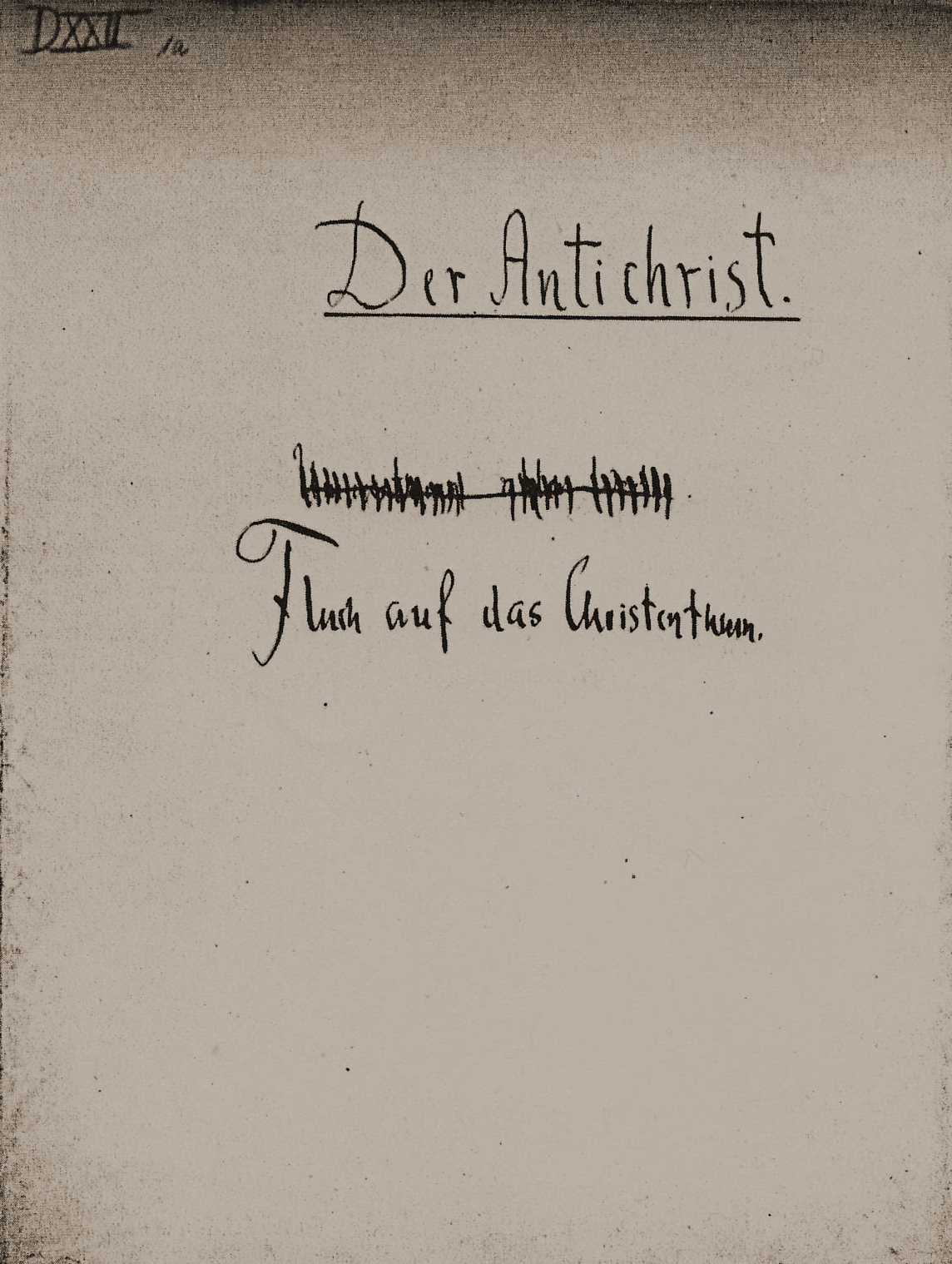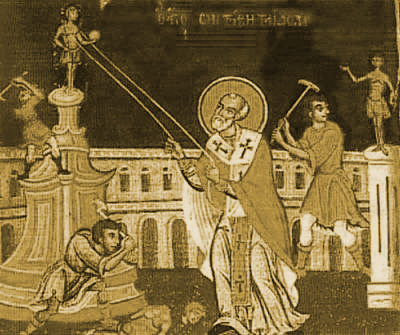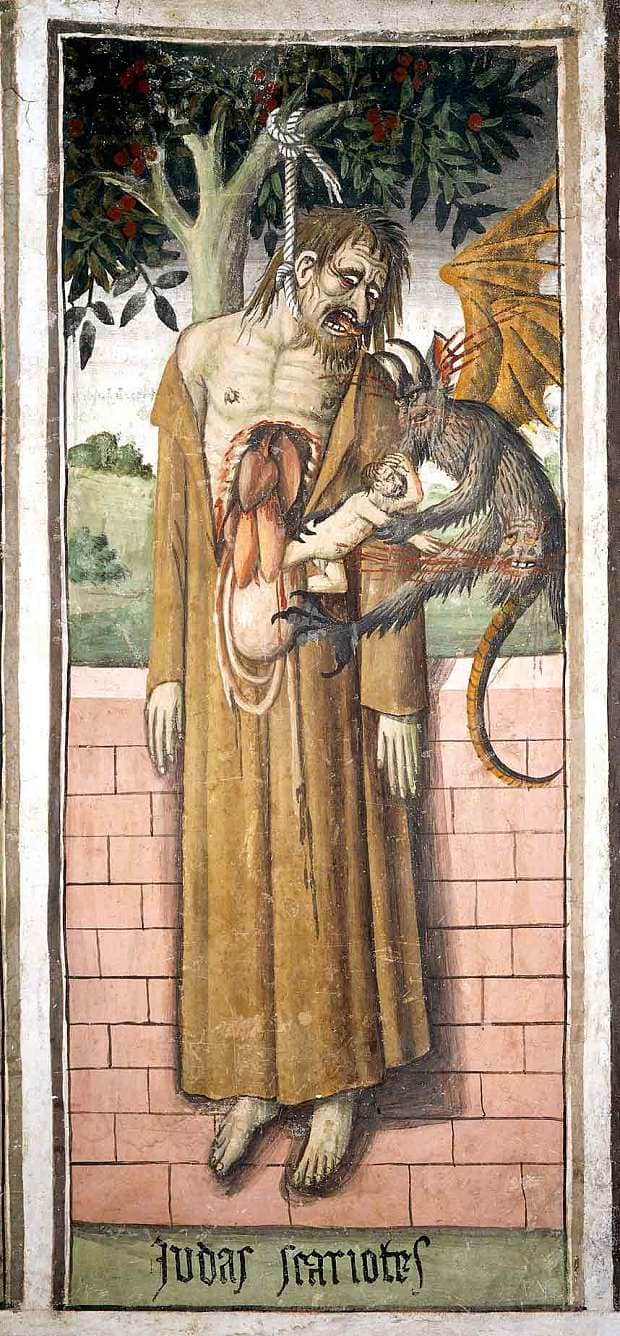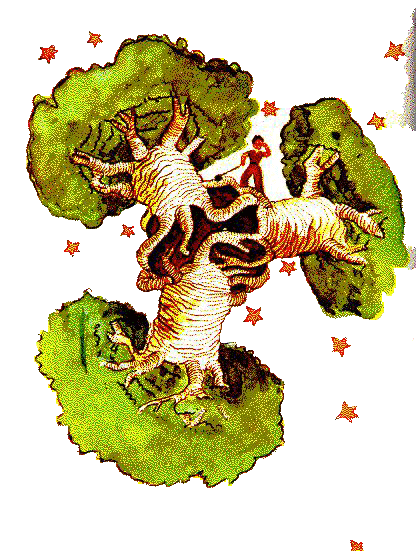 The weak and the failures should perish: first principle of our love of humanity. And they should be helped to do this.
The weak and the failures should perish: first principle of our love of humanity. And they should be helped to do this.
What is more harmful than any vice? – Active pity for all failures and weakness – Christianity…
Month: April 2018
Louis Beam said: ‘The real problem is you… that has given this land to the enemy… There is no such thing as Jewish domination. There is only white submissiveness. Refuse to submit and there is no longer domination’.
https://youtu.be/yV14nQIzMjU
Below, an abridged translation from the first volume of Karlheinz Deschner’s Kriminalgeschichte des Christentums (Criminal History of Christianity). For a comprehensive text that explains the absolute need to destroy Judeo-Christianity, see here. In a nutshell, any white person who worships the god of the Jews is, ultimately, ethnosuicidal.
Ambrose’s struggle against Hellenism
Like many other Church fathers, Ambrose was subject to the influence of Greco-Roman philosophy, especially Plotinus. However, he speaks of it quite critically, relating it to ‘idolatry’, a special invention of Satan, and also to the ‘heretics’, especially the Arians. If this philosophy has something good it is that it comes from the ‘Holy Scriptures’, from Ezra, David, Moses, Abraham and others. It also considers all the natural sciences as an attack on the ‘Deus maiestatis’. The Hellenism is for him, as a whole, an ‘arma diaboli’, and the fight against it ‘a fight against the Empire of the devil’ (Wytzes).
The young Gratian at first had given a good treatment to the Hellenists, but he learned from his spiritual mentor ‘to feel the Christian Empire as an obligation to repress the old religion of the state’ (Caspar). This was no longer difficult, since Christianity was established and paganism was in retreat. After the visit to Rome by Gratian and his co-regent in 376, the city, still largely clinging to the old faith, experienced the destruction of a sanctuary of Mithras by the prefect Gracchus, who, pending baptism, thus demonstrated his merits.
In the summer of 382, Ambrose was in Rome, probably horrified by the many Gentiles, the ‘demented dogs’, as were called by Pope Damasus I, a Spaniard, and while he was talking about persecution, the Christian members of the Senate had to pay their official oath before the image of the goddess Victoria.
At the end of that same year, the sovereign (who would soon be assassinated) disposed, ‘evidently by the advice of Ambrose’ (Thrade), ‘with all certainty not without the influence of his paternal adviser Ambrose’ (Niederhuber), a series of peremptory anti-Hellenist edicts for the city, by virtue of which the support of the State was withdrawn from various cults and clergy, like the popular Vestals, the exemption from taxes was annulled and the ownership of the land of the temples was denied.
 The monarch also ordered the removal of the statue of the goddess Victoria, a masterpiece of Tarentum taken from the enemy and also a highly venerated symbol of Roman rule. Since Victoria was one of the oldest national deities, with a cult statue in the Senate hall since the time of Augustus (only Constantius II had recently withdrawn her), most of the senators and Hellenist citizens of Rome felt offended about what was most sacred.
The monarch also ordered the removal of the statue of the goddess Victoria, a masterpiece of Tarentum taken from the enemy and also a highly venerated symbol of Roman rule. Since Victoria was one of the oldest national deities, with a cult statue in the Senate hall since the time of Augustus (only Constantius II had recently withdrawn her), most of the senators and Hellenist citizens of Rome felt offended about what was most sacred.
______ 卐 ______
Liked it? Take a second to support The West’s Darkest Hour.
Walsh quote
‘If that diagnosis is correct then the racialist movement will never get its act together and organize an effective resistance that kills enemies of the white race. It is like a drunk trying to act sober. They can’t get their act together and are a joke. The movement is just the last pathetic cringeworthy gasps of the somewhat healthier elements of a dying species attempting to survive’.
 John Canavesio, The Suicide of Judas, ca. 1492: a fresco painting from the Chapel of Notre Dame des Fontaine, France. The painting shows the corpse of Judas, who, overwhelmed by the guilt for having betrayed what many pseudo-racists still call ‘Our Saviour’, had committed suicide. A devil extracts the soul from the body of Judas, presumably to take it to hell.
John Canavesio, The Suicide of Judas, ca. 1492: a fresco painting from the Chapel of Notre Dame des Fontaine, France. The painting shows the corpse of Judas, who, overwhelmed by the guilt for having betrayed what many pseudo-racists still call ‘Our Saviour’, had committed suicide. A devil extracts the soul from the body of Judas, presumably to take it to hell.
The reason why we must destroy Christianity and burn all the churches is that whites, now almost a corpse of what they were, are following the steps of Judas. Even some in the Alt-Right begin, barely, to glimpse it: as Ramzpaul says in his most recent video. There he speaks that a religious guilt, previously controlled by the redeeming figure of Christ, has metastasized into runaway guilt that can only be expiated through ethnic suicide.
There will not be general awakening. Because of Christianity, the devil that took our soul out of our bowels, the white race is doomed to perish. If at least three percent of whites were willing to fight, as Norman Spear says, we would not need to unite the right: only join that three percent. But not even that percentage of whites are willing to give their lives for the cause. A civil war only has chances to occur with the convergence of catastrophes, beginning with the fall of the American dollar.
Even the people of the Alt-Right do not seem to see the degree of nihilistic psychosis in which their race is found. I have not visited Toronto since 1982 but if I did and saw the masses of people of colour that Ramzpaul saw, as he tells us in his most recent video, I would feel a superlative hatred: something that no Alt-Right figure, including Ramzpaul, says publicly.
However, Ramzpaul hits the nail with his comments about guilt. I remember how it lacerated me what my father said to me: that Jesus had died for me. My brother, with such an education, went astray in liberation theology. Let’s visualize Leonardo Boff taking ‘baths of people of colour’ in Brazil, that is, giving us the virtuous signal that he is a holy man. No wonder those who leave the church are left with the worm of guilt and deranged altruism.
I refer to the stupid atheists: those who, stupidly, believe they have abandoned Christianity. They have not. The only thing they have done is going mad like Judas and try to exorcise their guilt in the only way that the secularized Christian ethic allows us: giving their lands and Aryan women to the Other…
Psychologically speaking, the triumph of Judea against Rome is complete. Whites are destined for extinction. Those who have not read Evropa Soberana’s essay will never understand what is happening. And if there are no catastrophes that I predict and the race continues in its guilt path, coloured historians will see that, except this blog, no racist of the 21st century wanted to see what was happening:
It is Xtianity, stupid!
Siege, 24
Linkage
 Here’s another new word to add to your vocabulary: Linkage. It used to be something known primarily to mechanics but, as of earlier this year, it could also be in your future. This one may replace ‘entrapment’ as the latest dirty trick of the System designed to deflate any potential the Movement may have before it can get off the ground. It’s a quasi-legal take-off on “guilt by association” which, even ten years ago, would never have held water except that, now, the source from which the juries and grand juries are drawn is sufficiently conditioned that they’ll indict or convict on cue from the System.
Here’s another new word to add to your vocabulary: Linkage. It used to be something known primarily to mechanics but, as of earlier this year, it could also be in your future. This one may replace ‘entrapment’ as the latest dirty trick of the System designed to deflate any potential the Movement may have before it can get off the ground. It’s a quasi-legal take-off on “guilt by association” which, even ten years ago, would never have held water except that, now, the source from which the juries and grand juries are drawn is sufficiently conditioned that they’ll indict or convict on cue from the System.
This arose out of the serious scare given to the System by one splinter of the Movement calling itself The Order. The System—so surprised and enraged that there is fight left anywhere—sought to tie in (or “link”) as many other Movement facets as they thought they could in order to, if not wipe them out totally, at least pin them down in a defensive legal jungle wherein they either retain expensive counsel or lose by default. Some top Movement people were literally on the run and others were sweating blood a few months ago because of it.
So be reminded: the bastards WON’T QUIT! You must—if you ever run seriously afoul of the System to where they can lay a legalistic finger on you—either disappear totally or confront them totally. No use playing.
Around here we didn’t worry so much about it (the Sedition trial investigations). Though we had about as much to do with The Order as did those who were being officially harassed (that is, practically nothing at all), our sympathies and our support for The Order ran the same as the others as well (that is, one hundred percent—as witnessed by those issues of SIEGE released at that time). Help for members of The Order? We were also in a position to lend about as much tangible support for those men as were the rest: zero. Again, the main difference was, we felt (correctly as it turned out) we were in fact untouchable in the newest System craze of “Linkage”.
Until things take a very radical turn, I’ll stand firm on one thing I’ve always said regarding System persecution: I’ve never yet seen smoke where there has not been some actual fire. The System cannot yet INVENT its cases out of thin air. They can ORCHESTRATE them but that requires your willing participation. They must have something to go on—however shaky—and they can only get that through their own agents or through YOU. In the case involving The Order, their prime move was based upon one of the annual gatherings held by the Aryan Nations group of Idaho, from out of which came the majority (if not all) of the members of The Order. Those who attended that latest gathering before The Order took their course of action were wide open and subject to this latest “Linkage” ploy to shut us down. Simply, if you were there, you must be involved.
Long before any of this was ever dreamt of, I ceased attending Movement gatherings. In complete candor, I did so because I dislike re-runs, especially when they entail traveling long distances and shelling out cash, so drastically scarce. Frankly, I can’t afford the journey plus I doubt there’s anything I could add that they haven’t already heard and vice-versa. The only thing that might have come out of such an expensive trip would have been my own name on a federal subpoena. And that I can really well live without.
No. Those few men calling themselves The Order said more in a month of furious action than the rest of us have said in twenty years. And of what significance to them at that point in time were federal subpoenas and the like? I don’t mind paying the price but, by God, I demand the price be worth paying!
Even before I stopped traveling around to Movement functions, I had become disinterested in such measly and bothersome things as “memberships”, etc. This really caused much anxiety among the faker-figureheads I’ve acted as general secretary for in the past. As Commander Rockwell said in the Sixties, there is but ONE membership, known loosely as “the Movement”—which is bled white and thoroughly confused and dissipated by dozens and dozens of useless, crappy fronts. In order to squeeze a tiny portion of the general pool of money held by this common membership, one is required to INVEST comparatively huge sums in becoming a professional mail-order con artist and, in the case of “Nazi” types, to engage in silly looking and potentially disastrous stunts for the press (which are then fed back to the membership to jack-off their emotions and draw off a little more money).
That’s Right Wingism but it’s not revolution. And I got tired of it.
Vol. XIV, #7, July, 1985
The context of Plato
In 490-470 B. C. Sparta and Athens, forgetting their jealousies and joining their forces, fought off the effort of the Persians under Darius and Xerxes to turn Greece into a colony of an Asiatic empire. In this struggle of youthful Europe against the senile East, Sparta provided the army and Athens the navy. The war over, Sparta demobilized her troops, and suffered the economic disturbances natural to that process; while Athens turned her navy into a merchant fleet, and became one of the greatest trading cities of the ancient world. Sparta relapsed into agricultural seclusion and stagnation, while Athens became a busy mart and port, the meeting place of many races of men and of diverse cults and customs, whose contact and rivalry begot comparison, analysis and thought.
This is the common way among normies to see Sparta unaware that, unlike the Athens that was in process of miscegenation, thanks to the closed, collectivist society of the Spartans (and apparently the Thebans), they kept the Aryan race for centuries to such a degree that the beautiful female Spartans did not need makeup. Durant here inverts the values so to speak. But we must understand that secular neo-Christians like Durant share the ethnosuicidal, universalist ideals of the Christian. Regarding the first philosophers, Durant adds:
They asked questions about anything; they stood unafraid in the presence of religious or political taboos; and boldly subpoenaed every creed and institution to appear before the judgment-seat of reason. In politics they divided into two schools. One, like Rousseau, argued that nature is good, and civilization bad; that by nature all men are equal, becoming unequal only by class-made institutions; and that law is an invention of the strong to chain and rule the weak. Another school, like Nietzsche, claimed that nature is beyond good and evil; that by nature all men are unequal; that morality is an invention of the weak to limit and deter the strong; that power is the supreme virtue and the supreme desire of man; and that of all forms of government the wisest and most natural is aristocracy.
Here it is clear that the weed of egalitarianism appeared without Judeo-Christian influence, although in the days of Athenian youth it was easy to purge weeds.
 Since I was a child I liked Le Petit Prince, where the little blond had to constantly be weeding his planet, so that the weed would not grow in baobab as happened in other neighbouring planets. When I was in Grammar School and read the story of Saint-Exupéry, everything I saw in movies and television seemed like positive messages for the West and the race of little blonds. I never would have imagined that the weed would grow in my lifetime until the planet split in pieces.
Since I was a child I liked Le Petit Prince, where the little blond had to constantly be weeding his planet, so that the weed would not grow in baobab as happened in other neighbouring planets. When I was in Grammar School and read the story of Saint-Exupéry, everything I saw in movies and television seemed like positive messages for the West and the race of little blonds. I never would have imagined that the weed would grow in my lifetime until the planet split in pieces.
 Now there were some terrible seeds on the planet that was the home of the little prince; and these were the seeds of the baobab. The soil of that planet was infested with them. A baobab is something you will never, never be able to get rid of if you attend to it too late. It spreads over the entire planet. It bores clear through it with its roots. And if the planet is too small, and the baobabs are too many, they split it in pieces…
Now there were some terrible seeds on the planet that was the home of the little prince; and these were the seeds of the baobab. The soil of that planet was infested with them. A baobab is something you will never, never be able to get rid of if you attend to it too late. It spreads over the entire planet. It bores clear through it with its roots. And if the planet is too small, and the baobabs are too many, they split it in pieces…
Children, I say plainly, ‘watch out for the baobabs!’
 —Let us look ourselves in the face. We are Hyperboreans, — we know well enough how remote our place is. ‘Neither by land nor by sea will you find the way to the Hyperboreans’: Pindar had already known this about us. Beyond the North, beyond ice, beyond death — our lives, our happiness…
—Let us look ourselves in the face. We are Hyperboreans, — we know well enough how remote our place is. ‘Neither by land nor by sea will you find the way to the Hyperboreans’: Pindar had already known this about us. Beyond the North, beyond ice, beyond death — our lives, our happiness…
Better to live on the ice than among modern virtues and other south winds!…
Because Amazon is already printing my books, and in another account The Fair Race will even be available, I removed the ads from my books that I had on the addendum to this site. I had titled it Daybreak Press but recently I modified it to, in my mother tongue, criticise Eschatology: a cult derived from Christian Science in which I was alienated throughout my twenties.
The founder of that sect, one William Walter, had crossed by a great agony in his youth to expurgate from his mind the idea of a personal god. Even during my perdition in Walter’s sect, I had already abandoned theism, as the idea of ‘God’ for the eschatologists is similar to that of the New Age in which each individual, not only Jesus, is Vere homo, vere Deus.
Although on the Addenda I now criticise Walter’s cult, his new vision of divinity is a clear advance compared to the idea of the volcanic demon worshiped by the ancient Hebrews: an idea that whites internalized with extraordinary ferocity since Constantine and his successors, except Julian, destroyed the classical world. Thus, the beautiful gods of the Hellenes were replaced by an exceedingly proud and primitive god, in whose Talmud it is said that the best among the Goyim must be exterminated.
But the idea of the providence of the ignorant Walter was not really new. It resembles, in a way, the new understanding of God of German philosophers such as Schelling and Hegel. Thanks to their philosophers, when Hitler created National Socialism, some Germans already had not only an idea of the divinity much more mature than the tribal god of the Hebrews (and of traditionalist Americans). The Germans also had a long history of exegetes who had subjected the New Testament to the highest possible scrutiny that one could imagine.
 (Reimarus, who restarted the criticism on the historicity in the gospel narratives since the subject had been suppressed when the Christians burned Porphyry’s books.)
(Reimarus, who restarted the criticism on the historicity in the gospel narratives since the subject had been suppressed when the Christians burned Porphyry’s books.)
On this site I have criticized Albert Schweitzer for having migrated, as a good neo-Christian, to Africa to help blacks after abandoning traditional Christianity. However, his book, in which he reviews the long history of German exegetes who studied the gospels, is a classic. Many, like Schweitzer himself, had no choice but to abandon traditional dogma after such an undertaking.
Culturally but not geographically, I am closer to Europe and National Socialism than to the United States. For the same reason, every time I approach the new posts of pro-white sites in America, I am astonished to see how backward they are compared, say, to Hitler’s anti-Christian table talks (whose excerpts I find myself moving to Ex Libris). Hunter Wallace of Alabama, for example, concludes his entry today with these words ‘The solution to all this is found in Jesus the Christ’.
Compare his words with what I recently said in Pilate or Jesus?: ‘You do not realise that, with that admiration [of Jesus], you, like so many white nationalists who are still clinging to their parents’ religion, are doing something harmful to the white race’. It was in that same post where I added: ‘It is this kind of thing that produces a tectonic earthquake, it opens a grand canyon so to speak, between me and the [American] nationalists’.
Years ago, it seems to me that on Radio Free Mississippi, Wallace discussed with Alex Linder the theme of Christianity throughout the podcast. But Linder is monolingual: he did not know, at least when he argued with Wallace, the Spanish texts of Evropa Soberana and Karlheinz Deschner in German that we have been translating for this site. As I have said elsewhere, the masthead of this site is Soberana’s essay; what the ten volumes of Deschner provide is a huge bibliography that validates Soberana’s claims.
I do not harbour any illusions. I know that pro-white Americans will die addicted to the Judeo-Christian drug until their race finishes dying. But perhaps my work may be of some use to those who, as Walter and I suffered while repudiating the volcanic demon, are in the process of apostasy.
Julian, 31
Julian presiding at a conference of Sectarians
(Edward Armitage, 1875)
VI
“Naturally the Caesar is concerned.”
“But without cause.”
“Without cause? You are a pupil of Maximus.”
“I am also a pupil of Ecebolius.”
“But he has not been with you for a year. Your brother feels that you are in need of a spiritual guide, especially now.”
“But Maximus is responsible.”
“Maximus is not a Christian. Are you?” The question came at me like a stone from a sling. I stared a long moment at the blackrobed Deacon Aetius of Antioch. He stared serenely back. I was close to panic. What did they know of me at Gallus’s court?
“How can you doubt that I am a Christian?” I said finally. “I was instructed by two great bishops. I am a church reader. I attend every important church ceremony here at Pergamon.” I looked at him, simulating righteousness doubted. “Where could such a rumour get started? If there is such a rumour.”
“You cannot be seen too often in the company of a man like Maximus without people wondering.”
“What shall I do?”
“Give him up.” The answer was prompt.
“Is that my brother’s order?”
“It is my suggestion. Your brother is concerned. That is all. He sent me here to question you. I have.”
“Are you satisfied?”
Aetius smiled. “Nothing ever satisfies me, most noble Julian. But I shall tell the Caesar that you are a regular communicant of the church. I shall also tell him that you will no longer study with Maximus.”
“If that is the wisest course, then that is the course I shall take.” This ambiguity seemed to satisfy Aetius. My friends often tell me that I might have made a good lawyer. As I escorted Aetius to the street, he looked about him and said, ‘The owner of this house…’
“… is Oribasius.”
“An excellent physician.”
“Is it wise for me to see him?” I could not resist this.
“A highly suitable companion,” said Aetius smoothly. He paused at the door to the street. “Your brother, the Caesar, often wonders why you do not come to visit him at Antioch. He feels that court life might have a… ‘polishing’ effect upon you. The word is his, not mine.”
“I’m afraid I was not made for a court, even one as celebrated as my brother’s. I resist all attempts to polish me, and I detest politicians.”
“A wise aversion.”
“And a true one. I want only to live as I do, as a student.”
“Studying to what end?”
“To know myself. What else?”
“Yes. What else?” Aetius got into his carriage. “Be very careful, most noble Julian. And remember: a prince has no friends. Ever.”
“Thank you, Deacon.”
Aetius departed. I went back into the house. Oribasius was waiting for me.
“You heard every word?” I hardly made a question of it. Oribasius and I have never had any secrets between us. On principle, he eavesdrops.
“We’ve been indiscreet, to say the least.”
I nodded. I was gloomy. “I suppose I shall have to stop seeing Maximus, at least for a while.”
“You might also insist that he not talk to everyone about his famous pupil.”
I sighed. I knew that Maximus tended—tends—to trade on his relationship with me. Princes get very used to that. I don’t resent it. In fact, I am happy if my friends prosper as a result of knowing me. I had learned Oribasius’ lesson, and I do not expect to be loved for myself. After all, I don’t love others for themselves, only for what they can teach me. Since nothing is free, to each his price.
I summoned a secretary and wrote Maximus asking him to remain at Ephesus until further notice. I also wrote a note to the bishop of Pergamon to tell him that I would read the lesson on the following Sunday.
“Hypocrite,” said Oribasius when the secretary had gone.
“A tong-lived hypocrite is preferable to a dead… what?” I often have trouble finishing epigrams. Or rather I start one without having first thought through to the end, a bad habit.
“A dead reader. Aetius has a good deal of influence with Gallus, hasn’t he?”
“So they say. He is his confessor. But who can control my brother?” Without thinking, I had lowered my voice to a whisper. For Gallus had become as suspicious of treason as Constantius. His spies were everywhere.
I blame Gallus’s wife Constantia for the overt change in his character. She was Constantius’ sister and took it for granted that conspiracy is the natural business of the human race. I never met this famous lady but I am told that she was as cruel as Gallus, and far more intelligent. She was also ambitious, which he was not. He was quite content to remain Caesar in the East. But she wanted him to be the Augustus and she plotted the death of her own brother to achieve this end. As for Gallus, even now I cannot bear to write about his reign.
